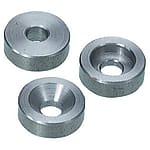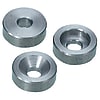(!)NOTE : Windows 7 users won’t be able to use some latest features of eCatalog/WOS since Microsoft is ending support for Windows 7 on 14 Jan, 2020. Please upgrade your system for uninterrupted services.
- Notice of End of Sales for Economy Series Pneumatic Equipment Category. More information.
Spacers, Washers(Surface treatment:Electroless nickel plated)
Spacers, Washers products in the Plastic Mold Components category. Specified by Surface treatment Electroless nickel plated. There are around 1 items of Spacers, Washers products available and the specifications can easily be compared. Plastic Molding Parts and accessories. Spacers, Washers offers a wide selection of products, on time delivery, free shipping and no minimum order quantity with a consulting team available.
Brand |
|
|---|---|
| CAD |
|
| Days to Ship |
|
1 items
- Sort By
-
You can add up to 6 items per a category to the compare list.

Free Washers -Normal・For Countersunk Bolt・Counterbore-
MISUMI
Free washer for general purpose, countersunk bolts, and counterbore. You can choose between no surface treatment or electroless nickel plating.
D (Outer diameter)(mm) d/P/V (Hole diameter)(mm) t (Thickness)(mm) Product type Material Surface treatment 5 ~ 100 3 ~ 68 1 ~ 50 Plain / For countersunk bolt / Counterbore S45C Electroless nickel plated Days to Ship: 8 Day(s) or more  8 Day(s) or more
8 Day(s) or more
| Brand |
|---|
| Product Series |
| CAD |
| From |
| Days to Ship |
| D (Outer diameter)(mm) |
| d/P/V (Hole diameter)(mm) |
| t (Thickness)(mm) |
| Product type |
| Material |
| Surface treatment |
You can add up to 6 items per a category to the compare list. | |
| Brand | MISUMI |
| Product Series | |
| CAD |
|
| From | |
| Days to Ship | 8 Day(s) or more |
| D (Outer diameter)(mm) | 5 ~ 100 |
| d/P/V (Hole diameter)(mm) | 3 ~ 68 |
| t (Thickness)(mm) | 1 ~ 50 |
| Product type | Plain / For countersunk bolt / Counterbore |
| Material | S45C |
| Surface treatment | Electroless nickel plated |
Loading...
Configure
Specification/Dimensions
-
D (Outer diameter)(mm)
-
d/P/V (Hole diameter)(mm)
-
t (Thickness)(mm)
-
Product type
-
Material
- S45C
- SUS416
-
Surface treatment
- None
- Electroless nickel plated
Related Categories to Spacers, Washers
FAQ Spacers, Washers
- Question: What is the difference between a spacer and a washer?
- Answer: Washers are primarily used to distribute pressure and prevent damage to surfaces when fasteners are tightened. Spacers are used to create a specific distance between two components. They often have more precise dimensions and tolerances than washers.
- Question: What materials are spacers and washers made of?
- Answer: Spacers and washers come in various materials, including: • Metal: Steel, stainless steel, aluminum, brass. • Plastic: Nylon, PTFE (Teflon), PVC. • Rubber: Neoprene, silicone, or other flexible materials for vibration damping or sealing. • Ceramic and composites are used in specific applications that require heat or chemical resistance.
- Question: How do I choose the right size of spacer or washer?
- Answer: • Inner Diameter (ID): The hole size should match the bolt or shaft it’s used with. • Outer Diameter (OD): Choose based on the load distribution required. • Thickness (for washers) or Length (for spacers): Depends on the gap or spacing needed in your assembly. For precision requirements, check the manufacturer’s specifications.
- Question: What factors should I consider when choosing a material for a spacer or washer?
- Answer: Strength and durability: The material should be able to withstand the loads and conditions of the application. • Corrosion resistance: If the spacer or washer will be exposed to corrosive environments, a corrosion-resistant material should be used. • Electrical conductivity: If electrical conductivity is important, a conductive material should be used. • Thermal conductivity: If thermal conductivity is important, a thermally conductive material should be used.
- Question: What are the common finishes for spacers and washers?
- Answer: • Zinc plating: Provides corrosion resistance. • Cadmium plating: Provides excellent corrosion resistance but is often avoided due to environmental concerns. • Nickel plating: Provides good corrosion resistance and a smooth finish. • Black oxide finish: Provides a dark, protective finish.








How can we improve?
How can we improve?
Thank you for your time.
Your feedback is essential for our continuous improvement
Privacy Policy
Thank you for your cooperation.
Thank you for your time.
Your feedback is essential for our continuous improvement
Please use the inquiry form.
Privacy Policy